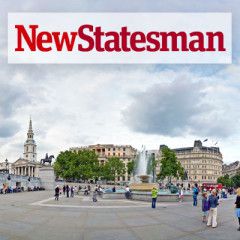Section: New Statesman (The United Kingdom)
How the Kremlin sees the rest of the world
Russian analysts reckon the US will be less focused on intervening around the world and will be more nationalist, mercantilist and interest-focused. Thomas Hobbes described the life of a man as “solitary, poor, nasty, brutish and short”. The Kremlin’s view of the world is dark and Hobbesian. But on a recent visit to Moscow, I was struck by...
Why vaccine hesitancy is a giant threat to global health and the conspiracy theory of our times
Campaigners frame themselves as heroic truth-tellers fighting to save children from a deceitful medical establishment in cahoots with Big Pharma. It has been 21 years since the British doctor Andrew Wakefield published a paper in the Lancet proposing a connection between the measles, mumps and rubella (MMR) vaccine and autism, and nine since he...
Chernobyl’s political fallout
The Chernobyl nuclear disaster was as much a symbol of a failed ideology as of flawed design and technology. In the city of Pripyat in Ukraine, built for workers at the nearby Chernobyl nuclear power plant, stands a bronze statue of the god Prometheus clasping fire in his outstretched arms. It was intended to symbolise the triumph of human...
Russell T Davies’s Years and Years is bold and brilliant
What audacity is here. What heart, what freedom, and what brilliance. Russell T Davies has said that his new series, Years and Years, is hard to describe succinctly, and that this is a worry to him because “I like a one-line pitch”. I like one-line pitches, too – I didn’t spend my twenties writing headlines for nothing – but having devoted...
Huawei has exposed Britain’s geopolitical reckoning
Britain faces a choice: align with the US, or strengthen Europe. Without deciding, it will continue stumbling into issues like the Huawei ban. When it comes to Huawei, Mike Pompeo – though perverse on everything else – is right. So is Gavin Williamson. It makes no sense for the UK to allow the Chinese tech giant to supply Britain’s fifth...
China, Russia and the return of the civilisational state
Such states reject Western liberalism and the expansion of a global market society. They define their countries as distinctive civilisations with unique cultural values and political institutions. The 20th century marked the downfall of empire and the triumph of the nation state. National self-determination became the prime test of state...
For god’s sake stop putting comedians in charge of governments
I’m a comedian and I recently ate all three meals in one day at Gregg’s. I am not fit to set monetary policy. Last week in the Ukraine, a country where, if you haven’t been following the news since 2014, everything is normal and fine, the actor and comedian Volodymyr Zelensky was elected president. Now I’m all in favour of...
Letter of the week: Reasons to be hopeful
A selection of the best letters received from our readers this week. Email [email protected] to have your thoughts voiced in the New Statesman magazine. Richard Smyth’s fascinating piece (“The green roots of fascism”, 5 April), sheds light on modern nature writing’s problematic relationship with fascism and quite rightly...
Ukraine is poised to elect a comedian as its next president
In a strange instance of art becoming life, Volodymyr Zelensky, who played the country’s president in a popular tv show, might soon assume the role for real. Ukraine may be about to elect a comedian as its next president. Some might see this as a dark joke, yet the rise of Volodymyr Zelensky reflects voters’ deep disillusionment with...
As the western alliance crumbles, Russia and China are moving closer together
On diplomatic issues such as Syria and Venezuela, the two powers appear increasingly in lockstep. As the Western world fixates on Donald Trump, Brexit and all its other problems, its rivals watch with fascination and glee. Russia and China are cooperating more closely than ever before, learning from each other and increasingly confident they can...



